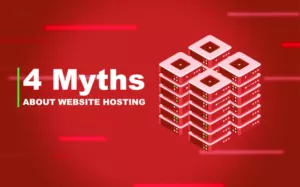A website’s speed has a significant impact on search engine rankings, user experience, and general business performance. A fast website is the result of several factors working together, but your hosting provider is the foundation of it all. A poor-quality host can seriously impair the functionality of your website, frustrating users and costing you business.

How Hosting Affects Website Speed
It’s important to understand how hosting directly affects website speed before getting into the details:
- Server Response Time: This gauges how fast user requests are handled by your server. Page load times will always be sluggish on a slow server.
- Hardware Resources: To successfully manage website traffic, powerful processors, lots of RAM, and quick storage devices are necessary.
- Network Infrastructure: To ensure that content is delivered to visitors worldwide promptly, a strong network with high bandwidth and low latency is essential.
- Server Location: You can cut down on load times by hosting your website closer to your intended audience.
- Software Optimization: Performance is greatly influenced by the server software and configurations used by the hosting provider.
Different Hosting Types and How They Affect Speed
Performance and speed are offered at different levels by different kinds of hosting. The following lists popular hosting choices along with how they affect the speed of websites:
1. Shared Hosting
The least expensive option is shared hosting, in which several websites utilize the same server resources. Shared hosting is less expensive, but it may result in slower speeds, particularly during times of high demand. It works well for low-traffic small websites, but it might not be the best option for sites that are expanding.
2. Virtual Private Server (VPS) Hosting
Compared to shared hosting, VPS hosting offers greater resources and improved performance. It provides you with dedicated resources by dividing a physical server into virtual servers. Websites needing improved speed and dependability and with moderate traffic may choose VPS hosting.
3. Dedicated Hosting
By allocating a whole physical server to your website alone, dedicated hosting provides the best speed possible. It ensures optimal performance and dependability, making it perfect for big websites with lots of traffic. It is, therefore, also the most costly choice.
4. Cloud Hosting
Your website will be hosted on numerous servers with cloud hosting, providing scalability and dependability. It guarantees steady speed by automatically adjusting resources according to traffic. A versatile option that works well for websites with different traffic patterns is cloud hosting.
5. Managed WordPress Hosting
Improved performance, security, and support are available with managed WordPress hosting, which is designed especially for WordPress websites. Hosting companies take care of the technical stuff, including backups and updates, so you can concentrate on content and expansion.
Tips for Choosing Better Hosting to Improve Website Speed
Choosing the best hosting provider is necessary for increasing the speed of your website. Here are some pointers to assist you in making a wise choice:
1. Assess the Needs for Your Website
Determine the needs of your website, such as visitor volume, resource consumption, and expected performance. For the best speed, pick a hosting package that fits your requirements.
2. Verify Server Locations
A hosting provider with data centers close to your intended audience is a good choice. Users in particular regions benefit from lower latency and faster load times as a result.
3. Look for SSD Storage
For greater performance and quicker data recovery than HDD storage, choose web hosting providers that offer SSD storage.
4. Look For Uptime and Reliability
A high uptime guarantees that users can always access your website. Seek out hosting providers that have a track record of reliability and uptime guarantees.
5. Consider CDN Integration
To improve speed and reach globally, choose hosting companies that have integrated CDN services or that make it simple to interface with third-party CDNs.
6. Give Security Features Priority
The overall performance and dependability of websites are enhanced by security features like firewalls, SSL certificates, and frequent backups. Select hosting providers that have strong security protocols.
7. Check Out The Customer Service
Quick handling of technological difficulties requires dependable customer support. Seek out hosting providers that assist at all times via a variety of channels, including live chat, phone, and email.
The Bottom Line
Enhancing search engine rankings, user experience, and general online success can be done by strategically choosing better hosting to speed up websites. Understanding how hosting affects website speed and selecting the best hosting plan can help you make sure your website loads quickly, draws in visitors, and operates at its best. Take your website’s requirements, take server locations into account, give SSD storage priority, and search for hosting companies that offer dependable uptime, security features, and first-rate customer service. You can maximize the functionality of your website and give visitors a flawless browsing experience with the correct hosting.
Let F8 Media help you with your hosting problems! F8 Media is a well-known web development company with a focus on web design and development. Get in touch with us right now if you need trustworthy and knowledgeable web developers on the Sunshine Coast to assist you with the development of your website.



